The Economics and Statistics Division maintains archives of previous publications for accountability purposes, but makes no updates to keep these documents current with the latest data revisions from Statistics Canada. As a result, information in older documents may not be accurate. Please exercise caution when referring to older documents. For the latest information and historical data, please contact the individual listed to the right.
<--- Return to Archive
For additional information relating to this article, please contact:
March 26, 2019NOVA SCOTIA BUDGET 2019-20 The Province of Nova Scotia tabled its 2019-20 Budget, with a surplus of $33.6 million (after consolidation and accounting adjustments). The latest forecast for the 2018-19 reports a surplus of $28.4 million . Nova Scotia's positive net position rises to $73.4 million by 2022-23. Over this period, revenues are projected to rise at an annual average growth rate of 2.4 per cent while expenditures (after consolidation and accounting adjustments) rise by 2.3 per cent per year.
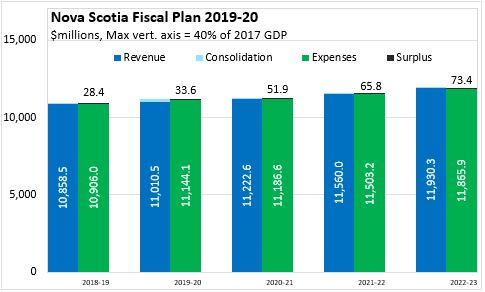
Nova Scotia's fiscal position was stronger in 2017-18 due to a one-time adjustment in petroleum royalties relating to an arbitration over the treatment of transportation costs in royalty calculations. For 2018-19, revenues are expenses are largely consistent with projections made in the 2018-19 Budget. Both revenues and expenditures are now projected to grow slightly faster in 2019-20 than expected at this time last year. The outer years of the fiscal plan remain consistent with previous projections.
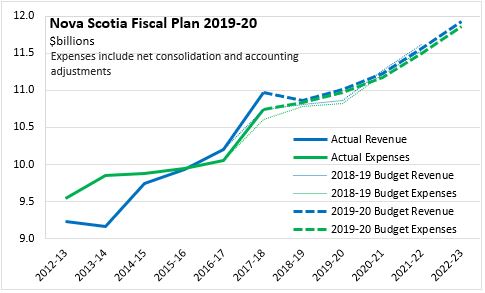
Nova Scotia's surplus reached $230 million in 2017-18 due to one-time revenues. From 2018-19 through 2022-23, the 2019-20 Nova Scotia fiscal plan anticipates surpluses in each fiscal year, rising slightly through 2022-23. This is consistent with the plan outlined in the 2018-19 Budget.
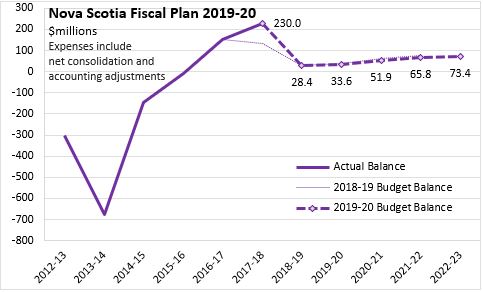
Measured as a share of provincial GDP, the current fiscal plan leads to a slightly smaller footprint of government. Revenues are projected to decline from 24.7 per cent of GDP in 2018-19 to 24.0 per cent of GDP by 2022-23. Expenditures are projected to decline from 24.8 per cent of GDP in 2018-19 to 23.8 per cent of GDP in 2022-23. The province's net position amounts to about 0.1 per cent of GDP in each of the next four fiscal years.
Nova Scotia's net debt to GDP ratio is projected to be 33.8 per cent by the end of FY2019-20. Over the following three fiscal years, net debt to GDP is projected to decline in each year, reaching 31.6 per cent by 2022-23.
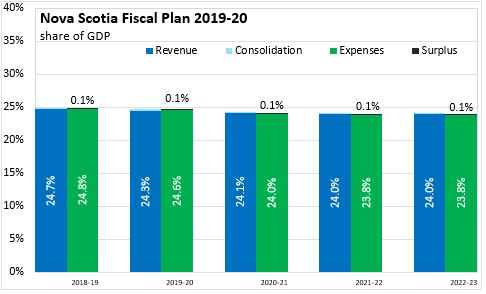
Nova Scotia's economic growth accelerated in 2017 with real GDP growth of 1.5 per cent. In 2018, real GDP growth is estimated at 0.9 per cent (3.0 per cent nominal), slowing in real terms as some major project expenditures reach their conclusion.
Nova Scotia's recent economic growth has depended on rising productivity, major investment projects and export growth. These have offset some of the constraints on labour supply and employment growth as the population ages. Nova Scotia's economy continues to grow because the province's business sector has generated strong productivity growth in each of the last five years. Exports (outside of energy) have also grown in each of the last 6 years and diversified to new markets in Asia and Europe. In the last two years, labour force and employment started to grow again as population increased at a much faster pace. Employment growth has outpaced labour supply, resulting in unemployment rates falling below historic averages.
Nova Scotia's Budget anticipates that provincial real GDP will grow by 0.8 per cent in 2019 (2.8 per cent nominal) and by 0.9 per cent in 2020 (2.9 per cent nominal). Residential construction expenditures are expected to slow while new project activities to decommission offshore production contribute to non-residential investment. Through the medium term, major project activities will accelerate growth in certain years, though the exact timing of these expenditures remains uncertain.
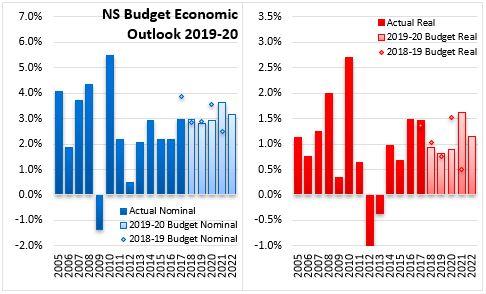
Key Measures and Initiatives
The Nova Scotia Budget announced several new and continuing initiatives under the government's key priorities.
Improving access to health care:
- $10 million increase to further develop collaborative care teams
- $2.9 million increase to open 15 residency spaces for specialty medical positions at Dalhousie University Medical School for a total of 65 seats
- $1.1 million continued funding to open 10 family practice residency seats at Dalhousie University Medical School this year for a total of 46 seats
- $2.2 million increase to improve access to hip and knee replacement surgeries
- $1 million continued funding for 11 mental health and addictions staff to support an adolescent outreach program in 41 schools in western and northern Nova Scotia
- $1 million increase to complete the province-wide SchoolsPlus expansion by September 2019
Investing in education and preparing youth for the workforce:
- $10.2 million increase to expand pre-primary classes
- $67 million total funding this year for the regulated child care sector, including expanding subsidies for families
- $15 million increase to continue implementing recommendations from the Commission on Inclusive Education
- $1.4 million increase to complete the reinstatement of the Reading Recovery program to all elementary schools by September 2019
- $3.6 million increase to the university operating grant as the province prepares to enter another multi-year memorandum of understanding with post-secondary institutions
Creating the conditions for economic growth:
- $850,000 increase to enhance export development programming for Nova Scotia businesses
- $500,000 increase for incubators and accelerators that support startup companies
- $2 million increase for Invest Nova Scotia to fund projects that increase competitiveness in economic sectors
- $620,000 increase to support growing immigration
- $15 million total funding for this year to expand and create tax credits that encourage investment in new and growing Nova Scotia businesses
- $415,000 increase to support Nova Scotia's Canadian Fish and Seafood Opportunities Fund and build on export success
- $1.7 million increase to move toward ecological forestry, including more silviculture
- $2 million increase in funding to make progress on revitalizing tourism icons across the province
Supporting people and communities:
- $14.2 million increase for programs that support adults and children with disabilities
- $5.6 million in new funding to introduce the standard household rate which will increase income assistance payments to recipients
- $5 million total funding this year for the third year of a three-year commitment to invest in poverty-reduction initiatives
- $1.7 million increase to fully implement the exemption of child maintenance payments from income assistance calculations so parents have more money to take care of their children's needs
- $3 million total funding this year to help prevent domestic violence
- $470,000 in new funding for sexual violence prevention work on university and Nova Scotia Community College campuses
- $3 million increase as part of a three-year plan to create 1,500 new rent supplements and reduce wait lists by 30 per cent
Budget 2019-20 contains $691.3 million for capital projects including schools, roads and highway, and an investment of $156.9 million to support the largest health care redevelopment projects in the province's history.
Nova Scotia Budget 2019-20
<--- Return to Archive